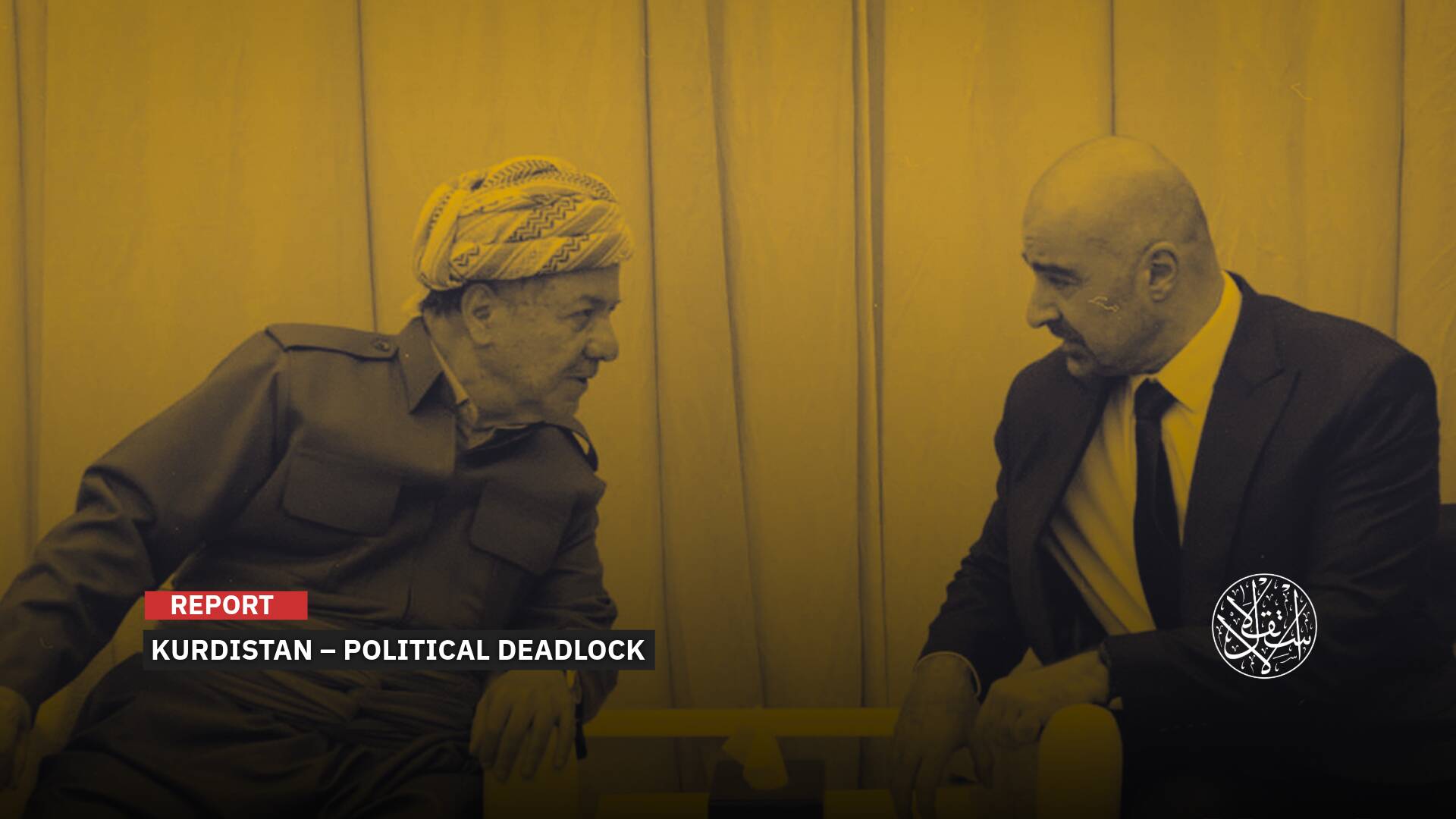Power Play or Coup Threat? Why Did el-Sisi Dismiss Defense Minister and Chief of Staff?

el-Sisi appointed a retired general to lead the military.
A peculiar paradox occurred in the two-stage cabinet reshuffle announced by the Egyptian regime on July 2 and 3, 2024. The initial announcement, leaked to the press, omitted the name of the defense minister. The following day, during the swearing-in ceremony, it became evident that he had been abruptly dismissed.
The ousting of Defense Minister Mohamed Zaki by the head of the Egyptian regime Abdel Fattah el-Sisi, who had appointed him in 2018 as a reward for his pivotal role in the military coup against the late elected President Mohamed Morsi, raised numerous questions.
el-Sisi appointed Abdel Majeed Saqr as the new Defense Minister, promoting him two ranks to first field Marshal, replacing Zaki. This sparked further questions about the motives behind appointing a "retired general" and overlooking the 25 members of the military council and others.
The dismissal of the defense minister and the appointment of a new one on the anniversary of the July 3, 2013 coup, in which Mohamed Zaki participated, raised questions about whether there is a crisis within the military establishment. Or is this merely a continuation of Sisi's game to tighten his grip on power and avert any potential coup against him?
Secretive Maneuvers
Until the end of July 2, 2024, Egyptian state-run newspapers listed the names of the new government ministers set to take the constitutional oath, conspicuously leaving the Defense Ministry unspecified, amidst unusual ambiguity.
This led some newspapers to speculate that Defense Minister Mohamed Zaki would remain in his position because it is a sovereign post. Other newspapers mistakenly reported that Major General Abdel Majeed Saqr was the Minister of Local Development, only to announce abruptly that he had been appointed Defense Minister.
Journalists told Al-Estiklal that the presidency intentionally kept the matter under wraps, providing no information about the Defense Minister's fate from "Samsung Apparatus," referring to the regulatory bodies dictating their reports.
Suddenly, el-Sisi granted Major General Abdel Majeed Saqr, a retired general outside active service and the Governor of Suez, two military ranks at once, from Major General to First Field Marshal, appointing him as Defense Minister and Lieutenant General, and ousting First Field Marshal Mohamed Zaki.

The statement from the head of the regime’s Spokesperson regarding the appointment of the new minister was also peculiar and confusing, noting that el-Sisi issued a presidential decree promoting Abdel Majeedd Saqr to the rank of First Field Marshal, without mentioning his appointment to the position.
This was followed by an announcement on the presidential website about the swearing-in of the new government ministers, including the new Defense Minister Abdel Majeed Saqr, and then a decree appointing Mohamed Ahmed Zaki Mohamed as an assistant to the President for Defense Affairs.
In the history of Egyptian politics, the title "Assistant to the President" usually signals that the individual is being sidelined, placed in a seemingly respectable position until they fade out of the public eye through death or the appointment of another "dismissed" assistant in their place.
Even before the official confirmation of his dismissal, it was noticed that the Ministry of Defense's official website had removed Mohamed Zaki's biography in preparation for uploading the new minister's profile.
The same occurred with the biography of Chief of Staff General Osama Askar, leaving only the names of the commanders of the air force, navy, and air defense.
In military tradition, appointing a retired general over current, higher-ranked, or more senior officers often means it will be difficult for these more senior officers to remain in their positions, as the new minister (who is less senior) would be their superior.
Thus, the reappointment of a retired military officer (who had been a civilian) back into service and promotion from Major General to General and then to First Field Marshal was equally perplexing.
This move is likely to be followed by a series of decisions involving the dismissal of several other high-ranking officers who outrank him.
Decoding the Mystery
In Egypt, it has often been customary to appoint the Chief of Staff as the defense minister if the latter is dismissed, except in specific cases and under certain historical circumstances.
For instance, the late President Mohamed Morsi appointed Military Intelligence Chief Abdel Fattah el-Sisi as Defense Minister in 2012 after retiring Defense Minister Field Marshal Mohamed Hussein Tantawi and Chief of Staff General Sami Anan.
Similarly, the late President Hosni Mubarak appointed retired General Yusuf Sabri Abu Talib as Defense Minister in 1989 to replace the powerful predecessor Abd al-Halim Abu Ghazala.
The late President Sadat appointed retired General Ahmad Ismail in 1972 to manage the October War of 1973 amidst disagreements with the then-military leadership.
The new Defense Minister, First Field Marshal Abdel Majeed Saqr, is the third retired military officer since 1970 to assume the Defense Ministry after leaving the armed forces for other executive roles, following General Yusuf Sabri Abu Talib and Field Marshal Ahmad Ismail.
el-Sisi's summoning of "retired General" Abdel Majeed Saqr was surprising, given that there are 24 other active military commanders in the military council besides the defense minister, any of whom could have been chosen, not to mention other commanders who are not council members.
Journalist Gamal Sultan, Editor-in-Chief of al-Mesryoon, questioned why el-Sisi overlooked all these commanders who head military divisions and sectors, asking, "Did he not find a single suitable leader among them to lead the army?"
Sultan pointed out that el-Sisi appointed a retired general, out of service for years, to lead the army.
Following this, another question was raised by military analysts, alongside the opposition politician and former presidential candidate Ayman Nour, regarding the military council's approval of appointing a "retired" general as Defense Minister and whether this aligns with the constitution.
Article 234 of the Egyptian Constitution stipulates that the appointment of the defense minister must be "approved by the Supreme Council of the Armed Forces."
Originally, this provision in the 2014 Constitution stated that this article shall apply for two full presidential terms, but when el-Sisi amended the constitution in 2019, this was removed, as he intends to remain in office indefinitely.
“If we assume prior approval from the Supreme Council of the Armed Forces, why was General Mohamed Zaki's name still listed as Defense Minister until July 2, mere minutes before his dismissal?” Nour questioned.
This prompted former military personnel to demand the Military Council to dismiss el-Sisi for violating military law, standing orders, and the constitution, and to bring him to trial.
However, a retired military source from a major agency informed Al-Estiklal that el-Sisi dismissed Zaki at the latter's request, citing an undisclosed illness that had visibly affected his health and appearance recently.
The source clarified that Zaki was initially slated to remain in the new lineup, hence his name was omitted from the announced ministerial reshuffle. However, he withdrew his candidacy at the last moment, requesting to be relieved of his duties.
This explains initial media reports suggesting Zaki would stay on, followed by the subsequent appointment of a replacement. Speculation leans towards appointing a current military leader rather than a retired general.
The source confirmed that Zaki himself had nominated General Abdel Majeed Saqr to succeed him as Minister of Defense.
Saqr previously served as an aide to General Mohamed Zaki during his tenure commanding the Republican Guard under President Mohamed Morsi. In 2018, Saqr assumed the position of Governor of Suez and has held several prominent roles, including Assistant Minister of Defense in 2015, Chief of Military Police, and Deputy Head of the Administration.
The source expressed surprise at the appointment of a retired general as Defense Minister, rather than one of the current serving commanders.
Anticipating changes in military leadership following the reshuffle, the source highlighted the sensitive timing amidst regional tensions along Egypt's borders with “Israel,” Gaza, Sudan, and others.
Four Reasons
According to military analysts and experts, the dismissal of Zaki and the appointment of a retired general as Defense Minister can be attributed to several reasons:
First, el-Sisi's strategy involves frequently rotating military leaders to maintain control and prevent them from consolidating power. Additionally, there is a desire to eliminate the "coup threat," amid speculation of potential disputes among military leaders and rising fears of a popular uprising due to worsening economic conditions, which might lead them to replace el-Sisi.
Furthermore, the appointment of Saqr may be seen as a temporary measure, similar to the appointment of General Yusuf Sabri Abu Talib in 1989. By appointing an unknown, older Defense Minister from outside the military council, el-Sisi prepares to place a close ally in the position. Finally, the extended and seemingly aimless cabinet reshuffle is aimed at removing Chief of Staff Osama Askar, who was speculated to be a military rival and potential replacement for el-Sisi.
Researcher Ahmed Abdin notes that the appointment of a retired officer as Defense Minister typically indicates a major crisis between the presidency and the military.
He cited historical instances such as Anwar Sadat appointing General Ahmad Ismail during General Mohamed Sadek's tenure, leading to strategic disagreements during the October 1973 war.
Another example was Mubarak's summoning of Field Marshal Yusuf Sabri Abu Taleb in April 1989, amidst a presidential-military disagreement, resulting in the dismissal of Marshal Abu Ghazala by orchestrating a scandal involving his relationship with businesswoman Lucy Artin.
The third instance was the dismissal of General Mohamed Zaki, who reportedly sought retirement three times due to illness, and the appointment of General Saqr in his place, despite the expectation for Chief of Staff Osama Askar to assume the Ministry of Defense.
Reports indicated tensions between the military and el-Sisi due to Zaki's popularity within the army and his strong ties with the U.S. Department of Defense and Gulf states. Consequently, el-Sisi initially removed him, only to reinstate him following the September 2019 protests and Marshal Tantawi's intervention.
el-Sisi's strategy revolves around rotating military leaders to fortify his rule and preempt any coalition formation within the military leadership that could pose a future threat.
This approach aims to make it challenging, if not impossible, for a coalition against him within the military leadership to emerge.
Moreover, the newly appointed Defense Minister lacks substantial influence within the military that could challenge el-Sisi's authority.
Previously, el-Sisi dismissed coup ally and former Defense Minister Sedki Sobhy in 2018, followed by his son-in-law, former Chief of Staff General Mahmoud Hegazy, and later Mohamed Farid Hegazy. Finally, he dismissed Osama Askar alongside Defense Minister Zaki.
Middle East affairs expert Ramy Aziz described el-Sisi as a seasoned expert in coups and intrigue, fearing potential coup attempts or conspiracies against him.
“He knows that the military council holds the power to overthrow him. Therefore, he constantly changes the Defense Minister and Chief of Staff and sows discord among the council members. He understands that the military council might turn against him in the event of a popular uprising or external directives,” he posted on X.
Egyptian politician and human rights advocate Osama Rushdi considers el-Sisi's actions as a "new coup," reminiscent of the events of 2013 and the July 3 coup anniversary. However, this time, it targeted the Supreme Council of the Armed Forces.
Rushdi discussed internal resistance within the Supreme Council of the Armed Forces against el-Sisi's decision to replace General Mohamed Zaki, as el-Sisi aimed to surpass rightful successors among military chiefs and council members who would oppose him, anticipating a significant upheaval within the council.
He stated that “el-Sisi came to power through a treacherous coup and does not trust the military. He understands that the tide can turn, which is why he constantly reshuffles the military leadership.”
Republic Collapse
The cabinet reshuffle coincided with talks about el-Sisi's fear of unrest and a potential uprising against him amid economic deterioration, power outages, rampant inflation, and the sale of hospitals for the poor. There are growing concerns that the "New Republic" in Egypt is increasingly at risk of collapse.
Many activists and social media users believe that recent changes, especially in the Chief of Staff and Defense Ministry positions, reflect the Egyptian presidency's fear of a potential coup against el-Sisi.
Middle East Eye, in an analysis by journalist and academic activist Hossam el-Hamalawy, noted that “social explosions are inevitable. He explained that amid economic devastation and harsh repression, quality of life has sharply declined since 2013, and whether organized opposition exists or not, social explosions are imminent due to the failure of Egyptian economic policies to achieve their objectives.”

The report indicates that the Egyptian regime “has no civil society to absorb or deflect dissent, and no broad class alliance invested in its survival. The only social contract that exists is repression in exchange for nothing.”
Political and military analyst Majed Mandour also cautioned in an article on Middle East Eye in early July 2024 that “el-Sisi's vision has crippled Egypt, a nation teetering on the brink of economic ruin.”
He stated that “Egypt is currently undergoing a comprehensive structural transformation, where millions have fallen into poverty while wealth has accumulated in the hands of a few, including the military elite and its associates.”
“This transformation will have long-term consequences that are largely unpredictable,” Mandour added.
Director of the Cairo Institute for Human Rights Studies Bahey Hassan asserts, "The July 3, 2013, coup no longer needs a revolution to overthrow it; it has effectively died, but its burial ceremonies have not yet taken place."
In an article published on The New Arab on July 3, 2024, he emphasized that “the coup has lost its political and ethical legitimacy, has functionally died, and is now on the verge of being consumed by worms, turning towards devouring the country itself.”











